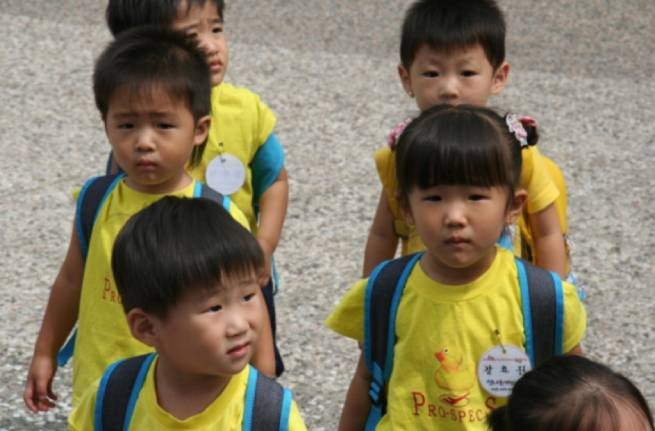Thanks to urgent and well-thought-out measures by the authorities, South Korea is beginning to emerge from its demographic crisis. Given the relevance of the problem for Greece, it is worth taking a closer look at what is happening in that country.
Not long ago, writes BB.LV, South Korea has found itself at a dangerous point, to which the country has been brought by urbanization*, abortions, suicides. Nevertheless, it is slowly is beginning to emerge from the demographic crisis – in the second quarter of 2024, for the first time in 8 years, the birth rate has increased. Statistics Korea said 56,838 babies were born from April to June, up 1.2 percent from the same period last year. The increase marks a first improvement since late 2015when the birth rate increased by 0.6%.
The growth comes amid acute demographic problems. President Yoon Seok-yeol declared a “demographic emergency” in June. Currently The South Korean government is stepping up efforts to overcome the country's extremely low birth rate and address the growing challenges of an aging population.
In 2020, South Korea had the lowest birth rate in the world, with a total fertility rate of 0.84. In the early 1960s, the rate was 6, but over the next 20 years, the country's birth rate fell below the replacement level, and by the mid-2000s, the total fertility rate had dropped below 1.3 (four children for every three families).
Due to the rapid aging of the population, the number of residents of the country will begin to decline in the coming years, For the first time in history, South Korea recorded a natural decline in 2020. At the same time, there will be a reduction in the number of people employed, a slowdown in economic growth, and an exacerbation of the crisis in the pension system.
Koreans (like the Japanese, Chinese, etc.) prefer to settle in densely populated, large economic centers and agglomerations, where there are more socio-economic opportunities and better infrastructure. Because of this problems of disproportions in the country's population arise. An example is the plan to relocate the capital of the Republic of Korea, partly due to the over-concentration of population in the Seoul National Capital Region, which was home to 25,674,800 people or about 50% of the Republic of Korea's population as of 2018. This leads to excessive overpopulation and high population density in large cities and urban agglomerations and, in turn, depopulation in rural and sparsely populated areas.
The main reasons for the sharp decline in the birth rate in the country are rapid urbanization, rising standards of quality of life and the peculiarities of Korean culture. The rise in living standards has led to the fact that To achieve the desired level of material well-being, Koreans began to start families later and sought to have fewer children.
With the birth rate falling below the replacement level, the sex of the child has become importantsince in Korean society it is considered necessary to have at least one son in the family, who should continue the lineage and take care of his parents in old age.
As a result, in the 1980s and 1990s, abortions began to be performed en masse in the country if screening showed that the child’s gender was female.. For every 100 boys born in 1990, there were only 89 girls. This subsequently led to a decrease in the number of women of childbearing age and an even greater drop in the birth rate. It is noted crisis of traditional values: more than half of Koreans are atheists, 40% of marriages end in divorce, and the country also has a high suicide rate.
Within the framework pilot project to stimulate birth rate growth Several dozen foreign housekeepers will arrive in South Korea, writes forbes.ru. According to the authorities, they will help women in the country do housework, thereby making it easier for them to decide to have a child.
According to the FT, about 100 Filipino citizens will soon arrive in the capital of South Korea to undergo language and cultural training before being hired as domestic workers. The workers who come under the program will receive 2 million won (about $1,450) per month. Some ordinary residents of the country, however, have criticized the project, noting that they will not be able to pay such a salary with their income. If the project is successful, another 1,200 such workers will arrive in the country by the middle of next year.
Previously, analysts at South Korea's Institute of Public Finance suggested sending girls to primary school a year earlier than boys to improve the country's low birth rate. They argued that creating an age gap between girls and boys in school would make them more attractive to each other by the time they reached marriageable age.
In December 2022, the South Korean government presented measures to combat low birth rates.the rapid ageing of the population and the associated problems in the labour market, which in the future may affect the growth potential of the economy, reports Renhap, citing the country's Ministry of Economy.
Officials intend to create stable conditions for having children by introducing benefits for women of childbearing age and eliminating opportunities for discrimination against them. They will be helped to reduce career breaks that women take to raise children, and will be helped to optimize the balance between work and family life. Young people will be provided with more opportunities to find housing and find work.
To address the labor shortage, the government plans to lift restrictions on hiring foreign labor and change its immigration policy to that end. Officials are also encouraging employers to hire older workers, and People aged 65 and over were promised benefits if they were hired. In addition, the social protection system will be restructured to reduce the poverty rate among the elderly population, which is one of the highest in the world.
We previously reported on the state of affairs with the birth rate in Greece. You can read about this in the article “Greece: The decline in birth rates in recent decades is a fact.”
*Urbanization is the process of increasing the role of cities, urban culture and “urban relations” in the development of society, an increase in the urban population compared to the rural population.







More Stories
Trump released Zelensky's letter requesting a meeting
Fake Kuleba and exposure of the crypto network
Türkiye will not participate in NATO exercises “Ramstein Flag 24” (video)